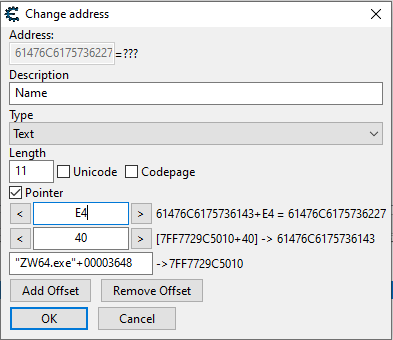Helper library for external windows game hacking.
Collaborative work provided by the CasualCommunity
- Download current release ("CasualLibrary1.0.rar") from the release section
- Extract *.h and *.lib file(s) at appropriate location in your project directory.
- Include them into your project.
If You want or need to build the project from source, You can either
- Download the whole repository
- Open the VS project (CasualLibrary.sln) with Visual Studio
- Right click the CasualLibrary and hit build
Or use cmake
- Create new folder in the projects root directory:
mkdir build - Navigate to the new folder:
cd build - Run cmake:
cmake .. - Build:
cmake --build .(tested with "Visual Studio 16 2019" and "GNU 6.3.0"/"MinGW Makefiles")
#include <iostream>
#include "CasualLibrary.hpp"
int main(){
Memory::External memory = Memory::External("target.exe");
Memory::External memoryDebug = Memory::External("target.exe", true); //use for debug messages
}Sample dll including the library
#include <Windows.h>
#include <iostream>
#include "CasualLibrary.hpp"
HMODULE myhModule;
DWORD __stdcall EjectThread(LPVOID lpParameter) {
Sleep(100);
FreeLibraryAndExitThread(myhModule, 0);
}
DWORD WINAPI Menue() {
AllocConsole();
FILE* fp;
freopen_s(&fp, "CONOUT$", "w", stdout); // output only
std::cout << "Running tests ...\n\n";
//add Code here
while (1) {
Sleep(100);
if (GetAsyncKeyState(VK_NUMPAD0))
break;
}
fclose(fp);
FreeConsole();
CreateThread(0, 0, EjectThread, 0, 0, 0);
return 0;
}
BOOL APIENTRY DllMain(HMODULE hModule,
DWORD ul_reason_for_call,
LPVOID lpReserved
)
{
switch (ul_reason_for_call)
{
case DLL_PROCESS_ATTACH:
myhModule = hModule;
CreateThread(NULL, 0, (LPTHREAD_START_ROUTINE)Menue, NULL, 0, NULL);
case DLL_THREAD_ATTACH:
case DLL_THREAD_DETACH:
case DLL_PROCESS_DETACH:
break;
}
return TRUE;
}//works for all types including uintptr_t, int, double etc. as well as custom structs and classes.
//does NOT work for arrays/vectors
Address address = Address(0x2240001C);
// read integer stored at address
int test = memory.read<int>(address);
// read string
std::string word = memory.read<std::string>(address);
//write value 5 starting at given address
memory.write<int>(address, 5);
//To check the memory before accessing it set memoryCheck = true
int testSave = memory.read<int>(address, true);
memory.write<int>(address, 5, true);//works for all types including uintptr_t, int, double etc. as well as custom structs and classes.
//does NOT work for arrays/vectors
Address address = Address(0x2240001C);
// read integer stored at address
int test = Memory::Internal::read<int>(address);
// read string
std::string word = Memory::Internal::read<std::string>(address);
//write value 5 starting at given address
Memory::Internal::write<int>(address, 5);
//To check the memory before accessing it set memoryCheck = true
int testSave = Memory::Internal::read<int>(address, true);
Memory::Internal::write<int>(address, 5, true);Address clientAddr = memory.getModule("client.dll");Address clientAddr = Memory::Internal::getModule("client.dll");Address baseAddr = memory.getModule("ZW64.exe");
Address healthAddr = memory.getAddress(baseAddr+0x00003648, { 0x40,0xE4 });Address baseAddr = Memory::Internal::getModule("ZW64.exe");
Address healthAddr = Memory::Internal::getAddress(baseAddr+0x00003648, { 0x40,0xE4 });Address address = memory.findSignature(0x7FF702CB5D00, "? 39 05 F0 A2 F6 FF" , 10000);Address address = Memory::Internal::findSignature(0x7FF702CB5D00, "? 39 05 F0 A2 F6 FF" , 10000);